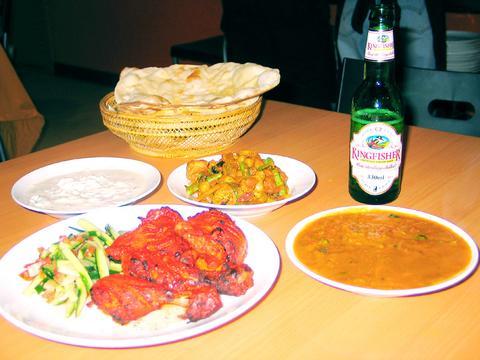Born and raised in India, Daniel Hsiung (熊懌騰) originally came to Taiwan to study Chinese cooking. After finishing cooking school and a few stints in various pub kitchens, Hsiung abandoned Chinese cuisine in favor of his native fare and opened The Spice Shop.
A fourth-generation Indo-Chinese, Hsiung is not the only member of his family to find success in the Indian restaurant business. In fact this is the sixth Spice Shop to open in Taiwan, as two cousins own and operate a total of five restaurants in Kaoshiung, Taichung and Hsinchu.

PHOTO: DIANA FREUNDL, TAIPEI TIMES:
Offering a large selection of vegetarian and non-vegetarian dishes, The Spice Shop serves up curry favorites such as beef madras (beef in coconut sauce), chicken tikka masala, mutton bhuna (mutton with onion and pepper) and others priced under NT$300 each. The most popular and highly recommended dish is the chicken tandoori (NT$300), served with a small side of kuchember (spicy Indian salad).
The vegetarian selection is equally plentiful and tasty. Made with seasonal vegetables the jhalfraizie (NT$180) is a refreshing change from the frozen veggies often used in mixed curry. Channa masala (chickpea curry), palak paneer (made with spinach and homemade cheese) and the daal all come highly recommended at NT$180.
Diners looking to satisfy a sweet craving after their curry will have to settle on a lassi, as there are no desserts on the menu. The mango lassi, made with fresh mango and yogurt, however, should not be overlooked.
The restaurant's decor remains debatable with a limited (yet eye-catching) selection of Indian tapestries hanging on exceptionally bright orange walls, with spindly chip board tables and plastic chairs.
A trained chef, Hsiung says he still prefers to be in the kitchen and still does most of the cooking. Apart from using less oil and chili, which can be increased on request, Hsiung claims he doesn't cater to Chinese or Western tastes, and instead prepares the food exactly as he would in India.
In less than two years since opening, The Spice Shop has acquired a substantial number of regulars who fill the tiny establishment nightly. With a maximum seating capacity of 40 persons, the restaurant fills up early, so reservations are not a bad idea, especially on the weekends.
Even at full capacity the wait for food is not intolerable and rather enjoyable with a selection of beers that includes India's own, King Fisher. Alternatively, patrons can bring their own bottle of wine, but are required to pay a NT$200 corkage charge.

The 1990s were a turbulent time for the Chinese Nationalist Party’s (KMT) patronage factions. For a look at how they formed, check out the March 2 “Deep Dives.” In the boom years of the 1980s and 1990s the factions amassed fortunes from corruption, access to the levers of local government and prime access to property. They also moved into industries like construction and the gravel business, devastating river ecosystems while the governments they controlled looked the other way. By this period, the factions had largely carved out geographical feifdoms in the local jurisdictions the national KMT restrained them to. For example,

The remains of this Japanese-era trail designed to protect the camphor industry make for a scenic day-hike, a fascinating overnight hike or a challenging multi-day adventure Maolin District (茂林) in Kaohsiung is well known for beautiful roadside scenery, waterfalls, the annual butterfly migration and indigenous culture. A lesser known but worthwhile destination here lies along the very top of the valley: the Liugui Security Path (六龜警備道). This relic of the Japanese era once isolated the Maolin valley from the outside world but now serves to draw tourists in. The path originally ran for about 50km, but not all of this trail is still easily walkable. The nicest section for a simple day hike is the heavily trafficked southern section above Maolin and Wanshan (萬山) villages. Remains of

With over 100 works on display, this is Louise Bourgeois’ first solo show in Taiwan. Visitors are invited to traverse her world of love and hate, vengeance and acceptance, trauma and reconciliation. Dominating the entrance, the nine-foot-tall Crouching Spider (2003) greets visitors. The creature looms behind the glass facade, symbolic protector and gatekeeper to the intimate journey ahead. Bourgeois, best known for her giant spider sculptures, is one of the most influential artist of the twentieth century. Blending vulnerability and defiance through themes of sexuality, trauma and identity, her work reshaped the landscape of contemporary art with fearless honesty. “People are influenced by

Ten years ago, English National Ballet (ENB) premiered Akram Khan’s reimagining of Giselle. It quickly became recognized as a 21st-century masterpiece. Next month, local audiences get their chance to experience it when the company embark on a three-week tour of Taiwan. Former ENB artistic director Tamara Rojo, who commissioned the ballet, believes firmly that if ballet is to remain alive, works have to be revisited and made relevant to audiences of today. Even so, Khan was a bold choice of choreographer. While one of Britain’s foremost choreographers, he had never previously tackled a reimagining of a classical ballet, so Giselle was